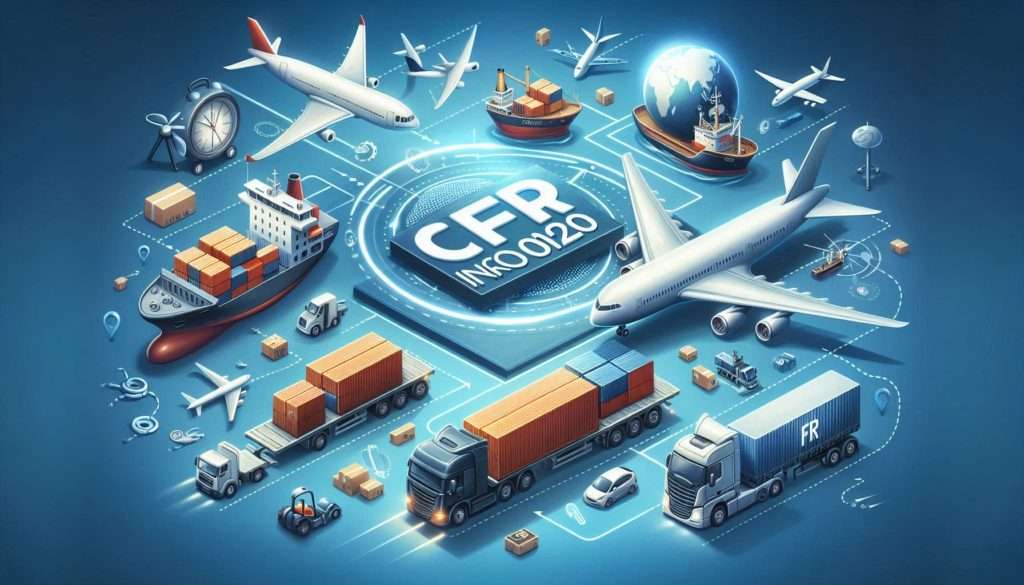If you are a global trader you should be familiar with CFR meaning. In the world of global trade, clear shipment terms are crucial for successful transactions. Among the terms in Incoterms 2020 by the International Chamber of Commerce (ICC), CFR (Cost and Freight) is significant. This blog aims to explain CFR meaning in Incoterms 2020, highlighting its implications, duties, and benefits for buyers and sellers.
CFR (Cost and Freight) Incoterms 2020 are commonly used by exporters and importers involved in international trade, particularly those dealing with goods transported via sea freight. Industries such as manufacturing, retail, and wholesale, where sea transportation is prevalent, frequently utilize CFR terms. Additionally, businesses engaged in importing raw materials or finished products via ocean vessels often opt for CFR terms to delineate responsibilities and costs effectively between the parties involved in the transaction.
Understanding CFR Meaning
CFR, or Cost and Freight, means the seller covers costs and freight to bring goods to the named destination port. Once delivered, risk shifts from seller to buyer.
Subscribe to the Ex-works24/7 newsletter
Frequently Asked Questions
What does CFR stand for in Incoterms 2020?
- CFR stands for Cost and Freight. It is one of the internationally recognized trade terms that defines the obligations and responsibilities of both the buyer and seller in a transaction.
What are the seller’s obligations under CFR?
- Under CFR terms, the seller is responsible for delivering the goods to the named port of destination and covering the costs of transportation to that port. Additionally, the seller must arrange for export clearance.
What are the buyer’s responsibilities when using CFR terms?
- The buyer’s responsibilities under CFR include arranging and paying for the cost of insurance from the port of loading to the final destination, as well as any additional costs incurred after the goods have been delivered to the port of destination.
When does the risk transfer to the buyer under CFR?
- The risk transfers to the buyer once the goods have been delivered to the carrier at the port of loading. From that point onward, the buyer bears the risk of loss or damage to the goods.
What is the difference between CFR and other Incoterms like CIF?
- The main difference between CFR and CIF (Cost, Insurance, and Freight) is that under CFR terms, the buyer is responsible for arranging insurance for the goods, whereas under CIF terms, the seller is responsible for providing insurance.
Can the buyer specify the carrier and vessel under CFR terms?
- Yes, the buyer can specify the carrier and vessel under CFR terms, but it is not a requirement. However, the seller is responsible for delivering the goods to the named port of destination, regardless of the carrier or vessel chosen by the buyer.
Who is responsible for insurance under CFR Incoterms?
- Under CFR terms, the buyer is responsible for arranging and paying for insurance from the port of loading to the final destination.
What happens if the goods are damaged during transit under CFR?
- If the goods are damaged during transit under CFR terms, the buyer bears the risk and must file a claim with their insurance provider to seek compensation for the damages.
How does CFR impact import/export clearance procedures?
- The seller is responsible for export clearance under CFR terms, while the buyer is responsible for import clearance at the port of destination.
Are there any additional costs associated with CFR terms?
- Yes, in addition to the cost of transportation, the buyer must also cover the cost of insurance and any import duties or taxes incurred at the port of destination under CFR terms.
Advantage on CFR Meaning
For sellers, CFR terms simplify pricing, focusing only on freight costs to the destination port, streamlining negotiations. Buyers gain clarity on risk transfer, enhancing confidence in shipping.
Both Parties consideration
Clear definition of the destination port in the contract is crucial for avoiding confusion. Understanding local customs regulations and import procedures at the destination port is essential for a smooth transaction.
Conclusion: CFR Incoterms 2020 establish a structured framework for global trade, ensuring clarity and fairness in shipments to destination ports. Understanding the implications and responsibilities of CFR terms empowers both buyers and sellers in navigating global trade efficiently and confidently.




